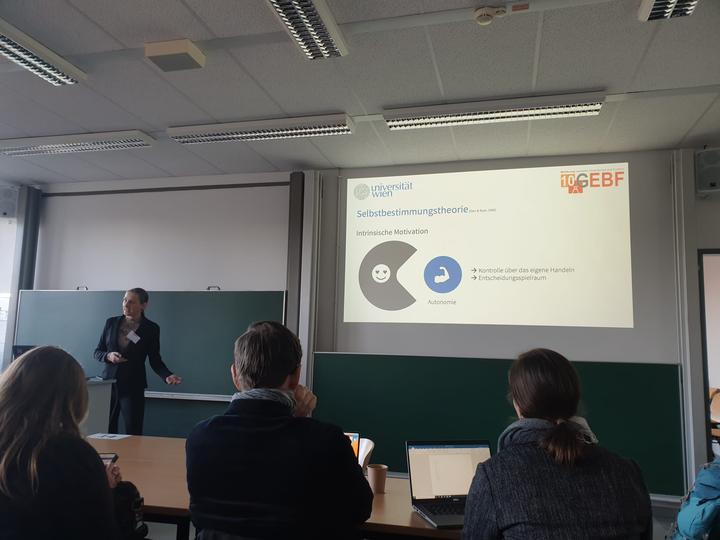Talk at the symposium **Student Motivation and Emotion in the Higher Education Context - Developmental Trends, Implications, and Promotional Strategies of Positive Academic Development.** @GEBF2023
 Presentation
PresentationAbstract
Self-determination theory (SDT) by R. Ryan and E. Deci (2020) postulates that the basic psychological needs for perceived competence, autonomy, and social inclusion are crucial for intrinsic motivation (IM) and positive learning behavior. According to SDT, the satisfaction of these basic psychological needs is influenced by the social environment (Ryan & Deci, 2020). Accordingly, it is reasonable to assume that the shift from face-to-face instruction to distance learning, which occurred almost universally around the world in March 2020 as a result of COVID-19 containment efforts, had an impact on students' satisfaction of basic psychological needs and, consequently, IM (Bartholomew et al., 2011). In addition, learning at a distance meant the elimination or at least the restriction of established structures, so that students increasingly had to organize and regulate their daily lives and learning themselves (Klingsieck et al., 2012). Self-regulated learning (SRL) skills therefore gained importance. Cross-sectional associations between basic psychological needs and IM have been established in various studies and contexts (Bureau et al., 2021; Ntoumanis et al., 2021; Reeve, 2016; Reeve & Jang, 2006; Rodrigues et al., 2021; Van den Broeck et al., 2016). However, the evidence regarding IM and SRL is less clear (Mukhtar et al., 2018; Ning & Downing, 2010). Studies examining reciprocal effect relationships between all three constructs over time are not available. Therefore, the aim of the present study was to examine the longitudinal and reciprocal effects between students' basic need satisfaction, IM, and SRL during distance learning in the course of COVID-19. Based on previous findings, we hypothesized that basic psychological needs satisfaction would be positively related to IM at each measurement time point. Furthermore, we assumed that satisfaction of the three basic needs would positively affect IM at the next measurement time point. In addition, we exploratory examined reciprocal relationships between IM and SRL, as previous studies failed to establish a clear direction of effect between these two constructs. Data collection took place as part of a larger study in which Austrian students were asked about their learning and well-being during COVID-19. In total, N = 3286 students (72.0% female, 27.2% male, 0.4% diverse, 0.5% missing) aged 14-71 years (Mage = 25.06; SDage = 7.038) answered four online questionnaires between April 2020 and July 2021. Partial metric measurement invariance was demonstrated across all four measurement time points for all scales used (perceived competence, perceived autonomy, perceived social involvement, IM, and SRL). A cross-lagged panel model was calculated to test the hypotheses described. Consistent with the hypotheses, the three basic psychological needs were positively correlated with IM at each measurement time point (r = .232 to r = .641). However, contrary to expectations, no significant effects on IM were found over time. Regarding SRL, small but significant positive effects on IM were consistently found across all measurement time points. In contrast, a small and, surprisingly, negative significant negative effect of IM on SRL was found between the third and fourth measurement time points. Although the already established cross-sectional associations between autonomy, competence, and social involvement were confirmed, our study clearly indicates the need for longitudinal investigations of the relationships postulated in SDT. Furthermore, the importance of SRL for IM in the context of distance learning was clarified. Furthermore, no or even a small negative effect of IM on SRL was found. One explanation could be that students with high intrinsic motivation pursue their goals without the conscious use of SRL strategies. A person-centered approach could provide further evidence for the (co-)development and mutual influence of IM and SRL.